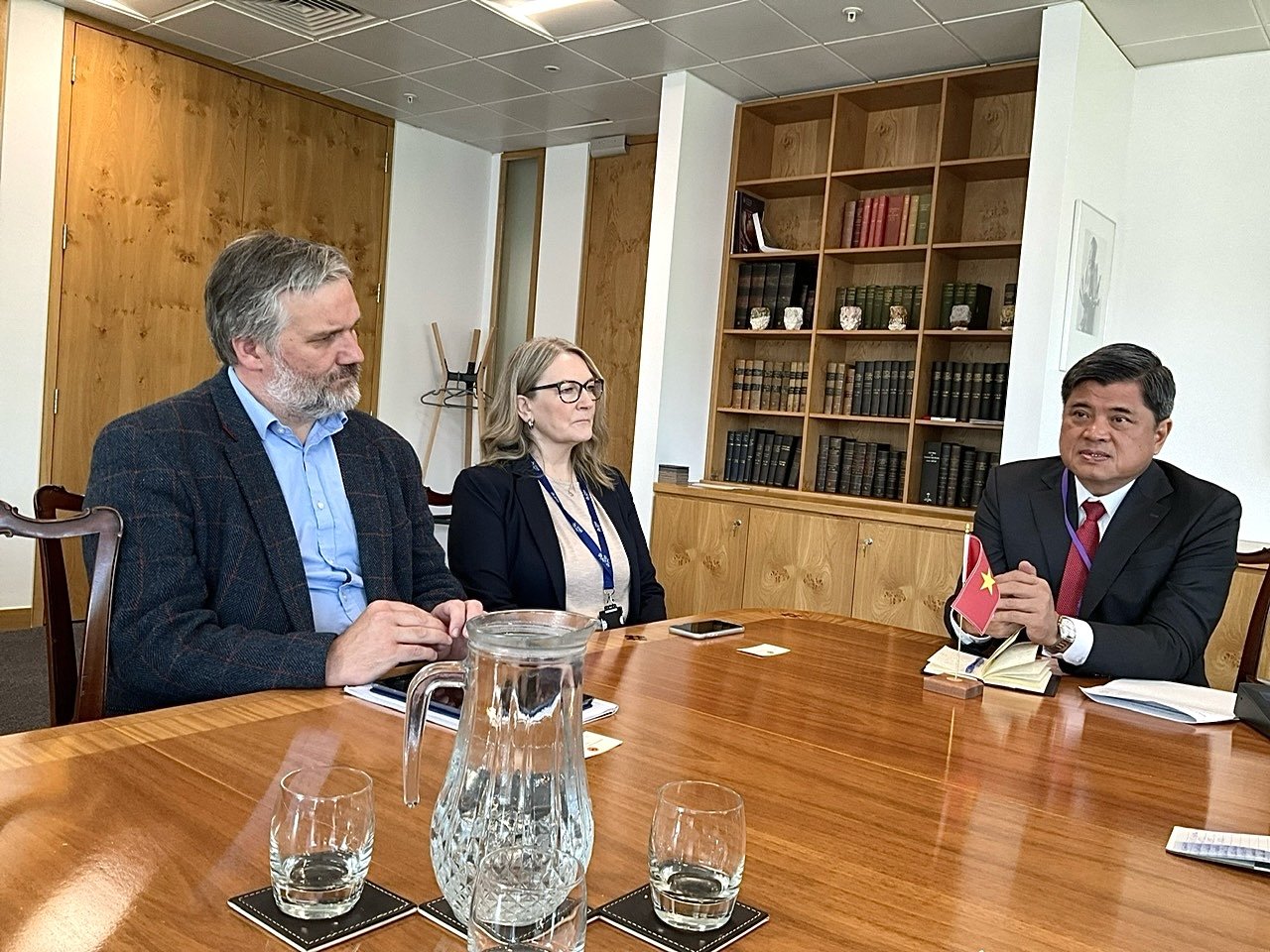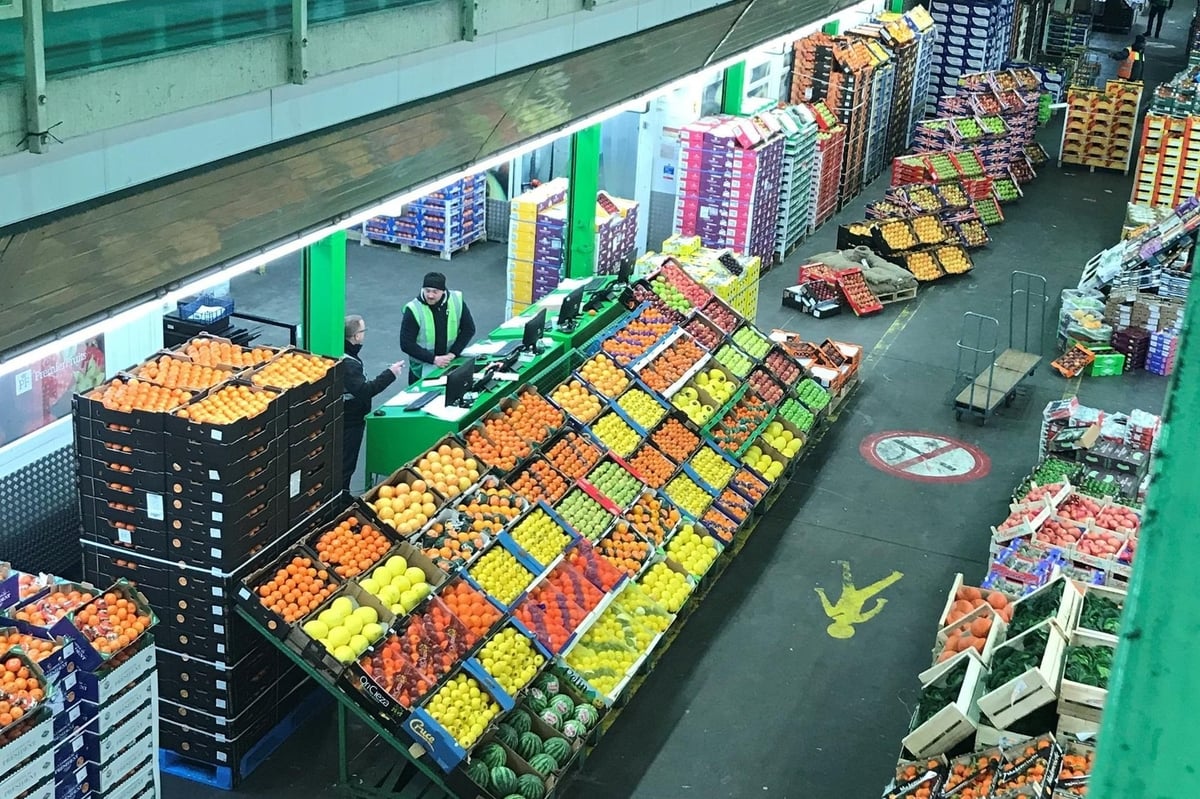November 19, 2025 | 08:21 GMT +7
November 19, 2025 | 08:21 GMT +7
Hotline: 0913.378.918
November 19, 2025 | 08:21 GMT +7
Hotline: 0913.378.918

On May 13 (UK time), Deputy Minister of Agriculture and Environment Tran Thanh Nam (right) visited and worked with the UK Department for Environment, Food and Rural Affairs. Photo: ICD.
At the working session, Deputy Minister Tran Thanh Nam expressed his appreciation for the close and effective collaboration between Vietnam and the United Kingdom in recent times, particularly in the fields of agriculture and environmental cooperation. He emphasized that the import and export commodities of both countries are not in direct competition but rather complement each other’s markets. This complementary nature creates favorable conditions for mutual support and growth.
Given this context, the Vietnamese side expressed its desire for the UK to continue supporting and actively promoting bilateral cooperation, especially in agricultural trade. Vietnam hopes that future cooperation will follow a sustainable direction, ensuring mutual benefits and reflecting the full potential and comparative advantages of both nations.
Regarding vocational training support, Vietnam hopes that the UK will help organize three annual training courses or workshops for approximately 20 trainees. These sessions would focus on vocational training and technical knowledge in areas such as food production and processing and agricultural mechanization.
With respect to trade cooperation in products of animal origin, Vietnam has already opened its market to pork and poultry meat from the UK. Furthermore, Vietnamese authorities are currently reviewing and processing additional proposals to expand market access for other UK products, including beef and poultry protein powder. At the same time, Vietnam is also considering increasing the number of UK enterprises authorized to export to the Vietnamese market.
“I propose that the UK side support capacity building in training and technical assistance for the development of a phytosanitary database, as well as the promotion of market access activities,” Deputy Minister Nam stated. “At the same time, I encourage strengthening cooperation in disseminating import regulations, thereby facilitating trade promotion of plant-origin products and plant protection substances, especially those that are safe and effective for crops.”
"Regarding the promotion of market access for timber and timber products, the two governments need to promptly coordinate and agree on a negotiation plan in order to sign soon a Timber Trade Agreement between Vietnam and the United Kingdom, similar to the contents of the FLEGT VPA Agreement that the Vietnamese Government signed with the EU. In addition, it is important to facilitate and remove barriers so that businesses from both countries can operate in accordance with the current legal regulations of each side," Deputy Minister Nam shared.

Food safety control is the key to expanding the Vietnam–UK agricultural product market. Illustrative photo.
Listening to the Vietnamese side's opinions, the UK Minister for Environment, Food and Rural Affairs, Daniel Zeichner, agreed that this is a favorable time for the two countries to boost agricultural trade.
"Both sides should consider further opening their markets to Vietnamese agricultural products. However, to realize this goal, strengthening food safety controls will be a key factor," Mr. Daniel Zeichner emphasized.
The Minister also proposed that the Agricultural Counsellor at the British Embassy in Vietnam should further promote their role in supporting market connectivity and advancing bilateral cooperation programs.
Building upon the Memorandum of Understanding (MoU) on cooperation in the fields of agriculture and rural development, signed between the two Ministries in November 2022, both sides have agreed to develop a comprehensive action plan jointly. This plan will place a particular emphasis on enhancing food safety control mechanisms, aiming to translate the commitments in the MOU into concrete and practical initiatives.
Specifically, the two sides agreed to strengthen cooperation in monitoring and addressing issues related to agricultural, forestry, and fishery shipments that do not meet food safety standards in bilateral import-export activities. Additionally, a working-level exchange is expected to be organized to share experiences in quality control, food safety inspection, testing, and risk assessment when accessing new markets.
Furthermore, there are plans to organize 1–2 annual training programs to enhance the professional capacity of around 15 staff members. Vietnam also expressed its desire to receive support from the UK in developing a food safety control and traceability model based on the value chain, with pilot programs for three key product chains: fruits and vegetables, processed pork, and seafood.
Translated by Phuong Linh

(VAN) Deputy Prime Minister Tran Hong Ha convened a meeting with the MAE and relevant agencies to discuss the draft decree on national multidimensional poverty standards for the 2026 - 2030 period.

(VAN) The year 2025 marks the 10th anniversary since more than 190 countries adopted the Paris Agreement on climate change, paving the way for strengthened global action.

(VAN) The PepsiCo Foundation funded the project ‘New Harvest: Sustainable Agriculture Initiative’, focusing on regenerative agriculture and climate change.

(VAN) Dr. Nguyen Viet Hung, ILRI's Regional Director for Asia, emphasized the One Health approach in ensuring food safety and reducing antimicrobial resistance risks in livestock.

(VAN) The youth-driven initiative ‘Innovate for water, act for the future’ seeks practical, scalable solutions to Vietnam’s water challenges.

(VAN) At the Annual Science Conference of Thuyloi University, Deputy Minister Phung Duc Tien directed researchers to focus on in-depth studies, data harmonization, and solutions linked to real-world practice.

(VAN) After nearly four years of implementation, 5,187 community agricultural extension groups have been established nationwide, with 47,493 members participating.